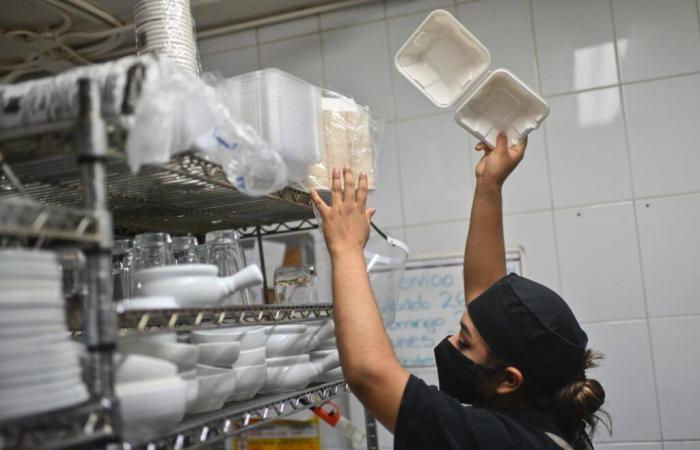Food packaging made from plant fibers can contain harmful substances and are not necessarily very sustainable, deplores the consumer association CLCV, in a study published Tuesday.
If the tests carried out by the association “do not indicate a health offense under the current regulations”however, they reveal “a composition that is not always very green and far too many claims likely to lead to confusion” for packaging made from plant fibers, perceived as more durable and less dangerous to health than the single-use plastic containers they replace.
Sugar cane pulp tray, corrugated cardboard pizza box, kraft cardboard soup pots and brown kraft paper burger packaging: the CLCV association analyzed five common packaging based on vegetable fibers ordered on sites supplying the takeaway catering.
These tests made it possible to detect bisphenol A in the pizza box. The presence of this endocrine disruptor, banned in France since 2015, could be linked to the use of recycled cardboard, supposes the CLCV.
The analyzes also suggested the presence, in the sugar cane pulp tray, of perfluorinated PFAS compounds. These pollutants harmful to health – called “eternal” because they are not very degradable in the environment – are often used for their waterproofing properties and resistance to high temperatures.
These packages are often lined with a plastic coating to make them waterproof. Result: “exaggerated promises” in terms of recyclability, underlines the CLCV. The association also denounces a « confusion » in the use of terms “compostable” et “biodegradable”.
For the association, manufacturers and professionals must be more transparent about the composition of their packaging.
The CLCV also urges public authorities to improve regulations.
The association particularly highlights the “bad articulation” between the REACH regulation on the manufacture and import of chemical substances in Europe, and the regulation on materials in contact with food, which “leads to inconsistent management, responsible for the presence of harmful substances such as bisphenols, phthalates or perfluorinated compounds in food packaging”.
“The replacement of disposable plastic packaging with others based on plant fibers does not seem to keep its promises in terms of safety and sustainability”summarizes the CLCV, which recommends favoring reusable packaging and zero waste, “only truly sustainable alternative”.






